Iranian Activists Call For Resilience, Unity Amid Regime Oppression
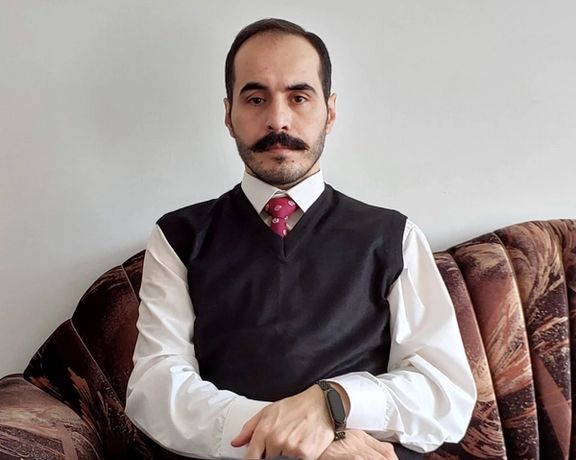
In the face of continued regime oppression, Iranian activists have called for increased resilience and unity, particularly as they mark the anniversary of Mahsa Amini's death.

In the face of continued regime oppression, Iranian activists have called for increased resilience and unity, particularly as they mark the anniversary of Mahsa Amini's death.
Prominent Iranian political activist Hossein Ronaghi penned a message, highlighting the unwavering determination and boundless courage of Iranians to bring about change in their country and “dispel the prevailing darkness”.
In his statement, Ronaghi acknowledged the relentless attempts by authorities to "disperse, isolate, and stifle the voices of activists through threats, repression, discord, and various tactics." Nevertheless, he asserted that such efforts have thus far failed and expressed confidence that they will not succeed "in silencing the collective will of the Iranian people."
Ronaghi, 37, has maintained his position as one of the most fearless critics of the Islamic Republic, refusing to leave the country despite facing multiple arrests and periods of detention over the past 13 years. His commitment to advocating for change led to his detainment in 2009 for his involvement in post-election protests, and he was once again arrested in February 2022 for criticizing a bill aimed at restricting internet access in Iran.
Meanwhile, Shirin Ebadi, a prominent Iranian jurist and recipient of the 2003 Nobel Peace Prize for her human rights efforts, particularly in advocating for women, children, and refugees, addressed a gathering of Iranians in Washington during the commemoration of Mahsa Amini's anniversary.
Ebadi underscored the paramount importance of unity, affirming that Iranians would not allow external forces to exploit their internal differences.
She went on to invoke the sacrifices made by the Iranian people throughout history, including significant events such as the Green Movement, Bloody November, and others, urging Iranians not to allow "the memory of such sacrifices to fade away."

Almost one year since his death, the family of Ali Seyedi still mourns their young hero who died at the hands of Iranian regime's security forces.
The clashes between several young female protesters and the plainclothes security agents in the city of Parand near Tehran were what prompted Ali to rush into their defense. Alas, little he knew that his not-to-be forgotten act of bravery would cost his own life.
Ali Seyedi had just celebrated his 25th birthday when Mahsa Amini, the young Kurdish woman who has emerged as a new symbol of Iranian women’s resistance against the theocratic dictatorship, passed away in hospital on September 16, 2022, due to the wounds inflicted upon her in police custody.
Mahsa’s death shook Ali to the core like hundreds of thousands of others all over Iran. He promptly joined the wave of protests and commenced posting anti-government content on his Instagram account.
However, this was not adequate to quell the flames of anger in Ali’s soul and quench the thirst for change simmering in his heart. Despite, the imminent danger he was well-acquainted with, Ali joined the ranks of thousands of other protesters who poured into the streets across Iran on October 26, 2022, which marked the 40th day after Mahsa’s death.
“Ali saved the girls, but the plainclothes forces shot him in the torso at close range, then dragged his wounded and bleeding body to the side of the street. A few hours later, when they saw that he was in critical condition, they abandoned him and left the scene,” Zhila Khakpour, Ali's mother recounted.
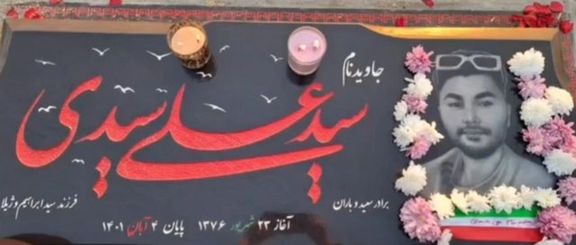
It took the Seyedis hours to finally find a lead about Ali’s whereabout. The police contacted the family around 5 AM the next day, only to inform them of Ali’s devastating death. Consequently, the backbreaking pressure from the authorities on the family for denying the fact that Ali was shot by the government forces and during a bloody day protest commenced. From menacing threats about not returning Ali’s corpse to his family, to depriving his parents from holding a public funeral for their son and arresting his brother and several of his friends at the cemetery where his tomb is situated, the regime knew no boundary. To this day, the Seyedi family continues to face ongoing pressure to keep them silent.
This has not been an isolated incident confined to the Seyedis. Over the past year, it has been the path that many grieving families have walked. These families lost their wives, husbands, daughters, sons, brothers, and sisters to the brutal crackdown on the widespread anti-regime protests in Iran last year. This trajectory has been especially common among those seeking justice for their loved ones who unjustly perished.
Until now, no one in the upper echelons of the autocratic regime has even remotely acknowledged any responsibility for the ruthless suppression of the protesters.
Reverting to its previous pattern of escalating suppression when confronted with demands for accountability and justice as the first anniversary of Mahsa Amini's death approaches, marking the initiation of what many Iranians now call the "Woman, Life, Freedom" movement, the regime has once more turned to its well-worn strategy of issuing threats and spreading fear among the grieving families.
Mahmood Amiry-Moghaddam, a Norwegian-Iranian human rights advocate and the director of the NGO "Iran Human Rights," has observed a significant increase in the persecution and prosecution of the victims' families. This surge can be directly attributed to the growing influence of the "Movement for Justice Seeking" for the victims of the regime in Iran, led by these families.
Furthermore, resorting to harassment of the protest victims’ families or anyone who can raise their voice, is closely related to the existential threat that the Iranian regime has faced following the outbreak of protests at Mahsa’s death, according to Amiry-Moghaddam. He added that the regime's tactics of intimidation and suppression are attempts to extend its longevity. The human rights advocate, however, deemed that fearmongering and suppression “might temporarily save a dictatorship, but sooner or later they would lose their control over the people again as such regimes lack stability.”
When evaluating the strategies employed by regimes that constantly fear facing the anger of their citizens, one of the most common approaches is to take preemptive measures to silence all dissenting voices. Consequently, in recent weeks, numerous outspoken members of grieving families who have either actively engaged on various social media platforms or maintained contact with other families, channeling their mourning into various forms of protest, have been summoned or arrested by regime forces.
The Iranian authorities have not disclosed the exact number of those arrested, nor have they provided reasons for their detention. In certain cases, they have even arrested lawyers who were representing these individuals, seemingly attempting to hinder the sharing of information regarding the families' status.
Moein Khazaeli, a journalist and human rights researcher based in Sweden, has suggested that the relentless crackdown by the Iranian regime's intelligence apparatus is motivated by their realization that "the justice-seeking families of the victims have become the face of the Woman, Life, Freedom movement in Iran." Consequently, the regime has prioritized suppressing these families by intensifying pressure on them, aiming to erase the identity of the protest movement and silence its voice, at least temporarily.
Sources familiar with the situation have informed Iran International that the authorities' main goal is to compel the arrested individuals into a vow of silence. This entails refraining from organizing anniversary ceremonies in memory of their loved ones and avoiding posting any calls for protests on social media.
The same fate befell some outspoken families of the protesters killed in what is commonly referred to as the “Bloody November” back in 2019 when mass protest rallies across Iran over the rising fuel price, soon turned into a call for toppling of the regime and received a violent reaction from Iran’s clerical establishment.
Reuters news agency reported in December 2019 that about 1,500 people were killed during less than two weeks of unrest including at least 17 teenagers and about 400 women.
Highlighting a similarity between the events of Bloody November and the Woman, Life, Freedom protests in Iran, Amiry-Mohghaddam pointed out that the efforts of the families of the 2019 crackdown victims have played a crucial role in reshaping the face of the Movement for Justice Seeking in Iran and attracting more international attention and recognition. As a result, the Iranian regime has sought to escalate its endeavors to restrain any actions by the families in ht elatest round of protests who are actively seeking accountability and justice for their deceased loved ones.
As the first anniversary of the Woman, Life, Freedom protest movement approached, the bold call for justice once again rose stronger and more determined than ever before. It stands as a precursor to the eventual downfall of a tyrannical regime that has consistently disregarded the needs and aspirations of its people. The departed have arisen to confront their oppressors and carry on their quest for justice.
“My son was a hero; he saved his fellow countrywomen. However, I always regret that he left without saying goodbye. We have not yet revealed the extent of the pressure that they (the Iranian regime) have exerted upon us; what I have recounted is merely part of the harassment we suffered,” said Ali’s sorrowful mother. She can only hold onto hope for a memorial ceremony on the first anniversary of her son's passing to ensure his name remains a part of the history of the freedom-seeking movement in Iran.
(This is an article by Maryam Moqaddam and Masoud Kazemi, journalists at Iran International)
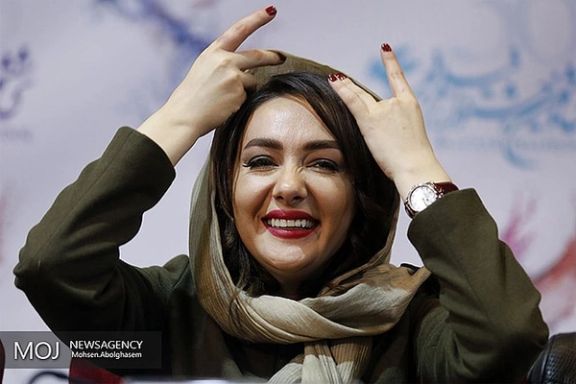
Renowned Iranian actress Hanieh Tavassoli has been released on bail after her arrest on Saturday night at her home.
Tavassoli was arrested for content posted on social media, including a tribute to Mahsa Amini, who was killed in morality police custody, on the day of national protests commemorating the one year anniversary of her death.
A few weeks before her arrest, Tavassoli had expressed her views on Instagram, suggesting that religious authority and clerical influence were diminishing in Iran. She also emphasized the need for Iranian cinema to align itself with “the intelligent, rebellious, and courageous youth and society of today.”
“Everything comes down to these three shining words: Woman, Life, Freedom,” she added. She is one of dozens of celebrities and famous personalities including athletes, arrested and punished for sharing anti-regime sentiment online. Many have lost work, had travel bans imposed and even seen bank accounts frozen.
Anti-regime demonstrations since the death of Amini last September, have witnessed mass hijab rebellion as people discard the mandatory Islamic head covering, a statement against the clerical establishment which since the 1979 revolution, has steadily consolidated power in Iran.
Recent years have seen a surge in discontent across the nation, driven by various issues, ranging from economic grievances to concerns about political and civil rights.
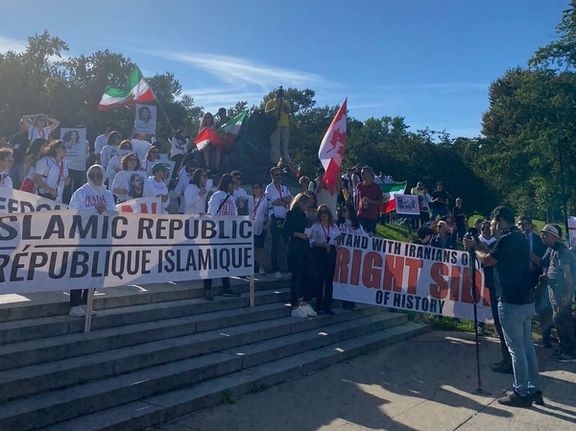
Iranians in Canada came together in gatherings nationwide on Saturday to mark the anniversary of the death of Mahsa Amini.
The events, held in multiple cities such as Toronto, Montreal and Ottawa, witnessed the participation of three Canadian ministers, highlighting their solidarity with the Iranian community and their support for human rights.
The Canadian foreign minister, Melanie Joly, participated in a demonstration in Montreal and expressed "unwavering support" for the "Women's Movement in Iran" through a tweet. "We will continue to sanction even the most senior leaders of the Iranian regime and work to recognize the regime for what it is— one that spreads terror," she said.
As of this weekend, Canada has sanctioned 176 Iranian individuals and 192 Iranian entities, including the IRGC and key members of the regime’s security, intelligence and economic apparatuses. Since October 2022, Canada has sanctioned 31 entities and 135 individuals.
Accompanying the Iranian community, Jenna Sudds, Minister of Family, Children, and Social Development, and Marc Miller, Minister of Immigration, Refugees, and Citizenship of Canada, also joined gatherings in Ottawa, where they delivered speeches to show their solidarity.
There are over 200,000 Iranian-born Canadians in the country, a large number of those emigrating since 2011.
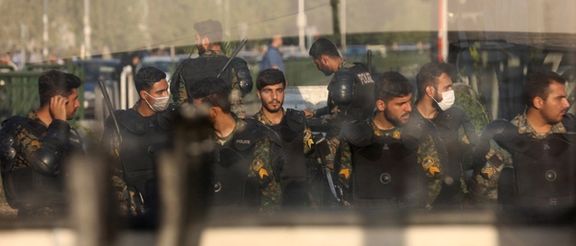
The following is a social media post by a retired member of the IRGC who fought in the Iran-Iraq war and witnessed the repressive environment in Tehran on Saturday.
-----------------------------------------------------------------------------------------------------------------------------------------------------------------
Today, Tehran is worse than the military government during the 1979 revolution.
In dealing with the people, you have outdone all the dictators in history. In 1357 [1978], I was fourteen years old, and I remember the military government in Ahvaz vividly. They would bring soldiers from their barracks and deploy them in the city. The uniformed, tired soldiers, with earth-colored uniforms and weapons in hand, had no idea why they had been brought into the city!
The most important principle of the military government was the prohibition of gatherings of more than three people during the day and a nighttime curfew. Nevertheless, religious gatherings with hundreds of attendees were held at night.
But what I witnessed today on the streets of Tehran is beyond words. I don’t exaggerate when I say that if a foreign country had occupied Tehran and Iran, they couldn't have deployed as many forces on the streets to prove that your country is occupied, and resistance is futile!
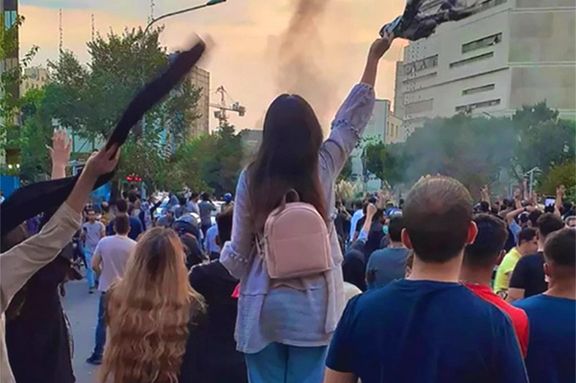
The occupier couldn't have maneuvered so many anti-riot police motorcycles through the city. The occupier couldn’t have indoctrinated so many of its troops to believe that people walking calmly, peaceful people, are the enemy!! Their outfits, what can I say? From head to toe, tightly equipped in black gear. I doubt that anywhere except in North Korea or Russia, such [repressive] gear exist.
Exactly like astronauts, like gladiators!
Of all I mentioned, what's worse and more horrifying is seeing plainclothesmen dressed in black tops and combat pants, or often jeans. They were heavily armed. With wireless devices, with electric batons and sticks. They had relatively long beards and menacing, demanding looks towards passersby, especially women. They arrested people for no reason, and they did so rudely.
A girl was walking with her male companion. They called out the man and the girl also stopped. They told her that they wanted to only question the man. But she stood there bravely. She told the agents that "we were strolling together and if we committed a crime, both of us should be arrested." They tried to intimidate her, to force her to leave. She stood there and, in the end, saved her friend in front of my surprised gaze. They left.
The police had brought so many prison busses that they could have transported tens of thousands of people. I was amazed. I often used to ask myself why our roads are so bad despite all that oil income. Why poverty wreaks havoc in the country. But today, with all the security gear I saw, I realized that this must have consumed half the oil income.
What have you done with Iran! How much seeds of hatred have you sowed? What a bunch of mercenaries you have trained. How much public money have you spent for protecting yourselves? Aren’t you ashamed? Indeed, you have outdone all dictators.
Is it possible to occupy a country in this way, especially a country with Iran’s history and civilization?
I forgot to say about brave girls who were walking in groups. Some with headscarves, some without, some with their mothers, some with their fathers, some with friends. They were so spirited, so carefree. I was trembling in fear, yet they were laughing heartily in front of the security forces. If only I could have taken a photo or a video.
Hundreds of officers in tight groups. How aggressively they warned commuters leaving the metro at Valiasr Square, shouting about their headscarves!
And what responses they got:
"It's none of your business; get lost!"
I couldn't believe my eyes! Kudos to you.
How foolish are those who think they can govern this generation with special units and the use of force! A generation that has changed significantly, far more than the authorities can imagine.
-----------------------------------------------------------------------------------------------------------------------------------------------------------------
Iran International preferred not to publish the name of the author, in order to prevent an unnecessary security risk for him. The comment was published on Telegram messaging app.
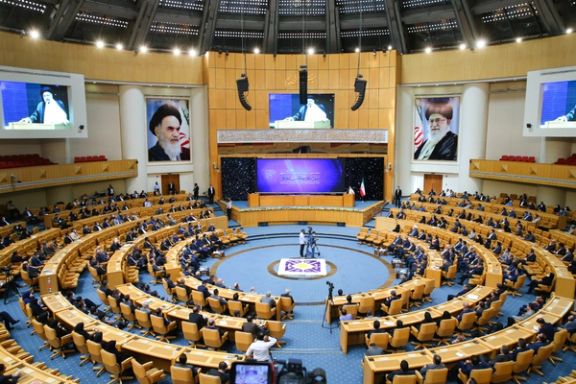
Iranian politicians have revealed further corruption among individuals involved in Iran’s shady privatization policy, which is widely criticized by the media.
Critics see a hasty plan to sell off government properties and companies as a way of "plundering Iran’s resources in the course of liquidating the country’s national assets."
Conservative news website Alef has quoted Ahmad Tavakkoli, the head of the Iranian NGO, Transparency and Justice Monitor, as saying in a letter to lawmakers, the heads of the three powers of the government and the privatization board that the plan "should be totally rejected."
The media reported in January that Vice President Mohammad Mokhber, Economy Minister Ehsan Khandouzi, Interior Minister Ahmad Vahidi, Roads Minister Mehrdad Bazrpash, and four other officials will form the Privatization Board. Reports at the time said that an order issued by the heads of the three powers of the government bars critics of disclosing details of transactions and suspends for two years all legislations that might prevent these transactions.
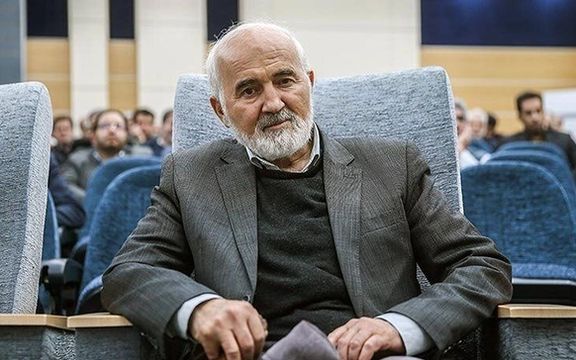
The members of the Privatization Board have asked for immunity against all criticism and possible legal prosecution.
The scheme is reminiscent of previous privatization efforts that led to huge corruption cases, when people bought public assets at a fraction of their market value often simply to sell valuable lands or borrow large sums from banks against the assets.
Tavakkoli, who is also a member of Iran's Expediency Council, a non-elected body whose members are appointed by Supreme Leader Ali Khamenei, also said that Khamenei has revoked his endorsement of the privatization plan. Tavakkoli is an established conservative politician, who belongs to the ‘principlist’ camp, which has lately been overshadowed by ultraconservatives who control the parliament and President Ebrahim Raisi’s administration.
While the plan is presented as an effort to make the economy more efficient and raise money for the cash-strapped government, critics believe there are powerful people involved whose only interest is to buy valuable lands at low pieces.
Criticizing Raisi’s privatization and other economic plans administration, Tavakkoli said the economic situation is so bad that "If an average Iranian worker saves one third of his monthly income to buy a house, it will take him 135 years to be able to afford buying one." He further warned that if the government undertakes to implement the shady privatization plan, this will be an end to many Iranians' hope to own a house."
Stressing that this is the third letter he is writing about privatization, Tavakkoli further warned that this plan will entail heavy losses and other consequences for the Islamic Republic as it extensively violates the rights of the nation.
Echoing previous warnings by other politicians and commentators, Tavakkoli argued that the plan will create new opportunities for corrupt individuals. He further accused the seven high-ranking members of the privatization board of planning to take advantage of their immunity before the law to spread financial corruption.
Meanwhile, former deputy culture minister Hossein Entezami in a tweet on Friday called Tavakkoli's letter "shocking." He added that "the seven members of the Privatization Board and their colleagues who enjoy permanent immunity from prosecution, have [so far] received 54 trillion rials ($108 million) for working on the board." He added: "I wish Vice President Mohammad Mokhber and Parliament Speaker Mohammad Bagher Ghalibaf will cease to insist on implementing the privatization plan."






